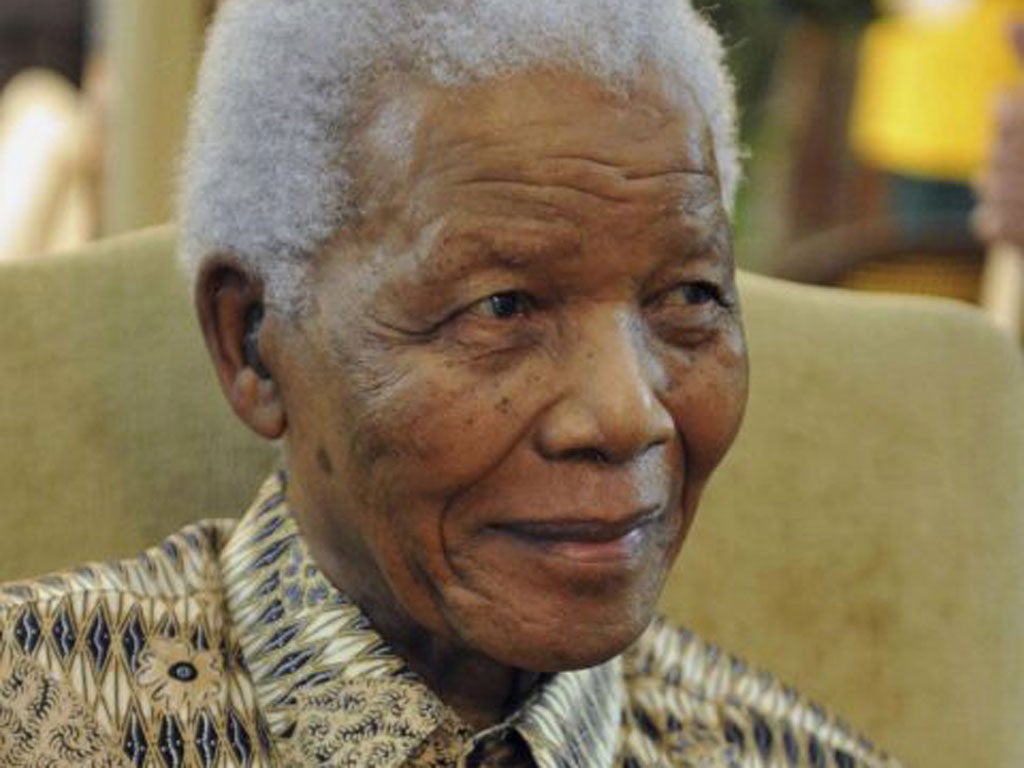
Your support helps us to tell the story
From reproductive rights to climate change to Big Tech, The Independent is on the ground when the story is developing. Whether it's investigating the financials of Elon Musk's pro-Trump PAC or producing our latest documentary, 'The A Word', which shines a light on the American women fighting for reproductive rights, we know how important it is to parse out the facts from the messaging.
At such a critical moment in US history, we need reporters on the ground. Your donation allows us to keep sending journalists to speak to both sides of the story.
The Independent is trusted by Americans across the entire political spectrum. And unlike many other quality news outlets, we choose not to lock Americans out of our reporting and analysis with paywalls. We believe quality journalism should be available to everyone, paid for by those who can afford it.
Your support makes all the difference.Former South African president Nelson Mandela has been admitted to hospital with a stomach ailment.
Mandela "has had a long-standing abdominal complaint and doctors feel it needs proper specialist medical attention," President Jacob Zuma said, asking that Mandela's privacy be respected.
The statement did not say at which hospital Mandela was being treated. In 2011, he spent a few days in a private Johannesburg hospital with an acute respiratory infection.
Mac Maharaj, Zuma's spokesman, said he could not immediately elaborate but that he would be issuing regular updates. The South African military, which had taken charge of Mandela's health care after he was hospitalized last year, and a spokesman for Mandela's office said they would have no statement Saturday.
Keith Khoza, spokesman for Mandela's African National Congress, said Zuma's office had reassured members of the nation's governing party.
Mandela "just had abdominal pains for some time now and the doctors decided a while ago that perhaps they should admit him, with a view to check those abdominal pains, so it wasn't an emergency admission," Khoza told reporters. "He's fine, he's in good health."
Mandela became South Africa's first black president in 1994 after spending 27 years in prison for his fight against racist apartheid rule, and he was awarded a Nobel Peace Prize for his efforts.
Well-wishers like Derek Kemper, a 47-year-old emergency services consultant, said they hoped Mandela would soon recover.
Kemper said he fought Mandela's African National Congress, now the country's governing party, as a soldier for the apartheid state. On Saturday, he was touring Soweto, the famed Johannesburg township set aside for blacks under apartheid and still largely black and poor, with a group of other whites. Kemper marveled at how far the country had come, and credited Mandela.
"He had the wisdom to try to reunite the country." Kemper said, speaking in front of a Soweto home where Mandela once lived that has been turned into a museum celebrating Mandela's life.
Kemper said he believed that even though Mandela has largely retired from public life, he has a moderating influence on younger black South Africans who may be impatient with the pace of change in their country. Kemper said he worried about whether the commitment to reconciliation would outlive Mandela.
But Kefiloe Molepo, a 19-year-old student who grew up just around the corner from Mandela's home, said there was little cause for concern. Molepo, walking home from church, said he was raised on stories about Mandela, who he said was a friend of his great-grandfather.
"When he was set free, he didn't think of vengeance," Molepo said. "He wanted peace for the nation."
Mandela's public appearances have become increasingly rare, though he did appear at the closing ceremony of the World Cup in July 2010. Mandela also held a private meeting with Michelle Obama when the U.S. first lady traveled to South Africa with her daughters last year.
Mandela has taken up permanent residence at his home in Qunu, in the southwestern region of South Africa where he was raised. Earlier this year, Mandela came to his Johannesburg home for what Zuma's office said would be a brief stay while maintenance was done at his Qunu home. Zuma's office said then that Mandela was in good health.
Mandela's last surviving sibling, a sister, died last month near Qunu. Makhulu Nothusile Bhulehluthi was 82. Nkosi Mphakanyiswa Gadla Mandela, their father, had several wives and 31 children.
AP
Join our commenting forum
Join thought-provoking conversations, follow other Independent readers and see their replies
Comments